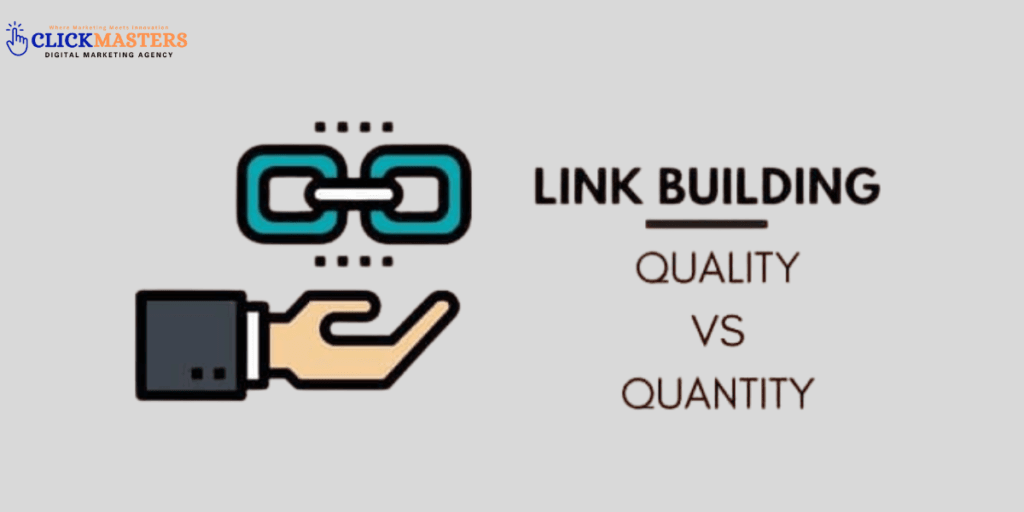In off-page SEO, link quality is more important than link quantity. High-quality links from authoritative and relevant websites signal to search engines that your content is trustworthy and valuable, improving your rankings. On the other hand, focusing on link quantity (getting many links) without considering quality can lead to spammy or low-value backlinks, which can harm your SEO efforts. Quality links help build domain authority, while excessive low-quality links may result in penalties. Thus, a few high-quality links are far more beneficial than many low-quality ones.

Link Quality vs. Link Quantity: Impact on Off-Page SEO
In the world of SEO, off-page optimization plays a crucial role in improving the visibility and ranking of a website on search engine results pages (SERPs). One of the key elements of off-page SEO is backlinks, also known as inbound links, which are external links from other websites pointing to your site. However, not all backlinks are created equal. Link quality and link quantity are two significant factors that influence the effectiveness of your off-page SEO strategy.
What is Link Quality vs. Link Quantity?
Before diving into how these factors impact off-page SEO, let’s first define link quality and link quantity in the context of digital marketing:
- Link Quality refers to the authority, relevance, and trustworthiness of the websites from which you receive backlinks. Quality backlinks are typically from high-authority sites within your niche, trusted sources, and those with a good reputation.
Link Quantity refers to the number of backlinks your site has, regardless of their source’s authority or relevance. While having a large number of backlinks might seem beneficial, it’s the quality of these links that truly impacts your SEO performance.
How Link Quality Impacts Off-Page SEO
Link quality is often the most important factor when it comes to off-page SEO. Here’s why:
Improves Search Engine Rankings
Search engines like Google assess the quality of backlinks to determine the authority and relevance of your website. High-quality backlinks from authoritative and reputable sources send positive signals to search engines. Google sees these links as a vote of confidence in your content, leading to improved rankings for your site.
- Example: If a high-authority website like a major news outlet or a well-known blog in your industry links to your content, Google interprets this as an endorsement. This can significantly boost your rankings for relevant keywords.
Increases Organic Traffic
Backlinks from trusted and high-traffic websites can drive organic traffic to your site. This is because users who trust those websites may click on your backlink, leading to increased visitors.
- Example: A backlink from an industry leader’s site may attract visitors interested in your niche, increasing the overall traffic to your website.
Enhances Brand Authority
When your website gets linked by well-respected, authoritative sources, your brand credibility and authority also rise. Being linked by trusted websites can establish you as an expert in your field, which indirectly enhances your website’s trustworthiness in the eyes of both users and search engines.
How Link Quantity Impacts Off-Page SEO
While link quantity is still a factor in off-page SEO, it can have both positive and negative effects depending on how it is approached. Here’s how it impacts SEO:
Increased Visibility
A higher number of backlinks, especially from diverse sources, can help search engines notice your website more frequently. This is particularly helpful for new websites looking to gain visibility. However, quality always trumps quantity.
Potential for Low-Quality Backlinks
Not all backlinks are beneficial. If you focus only on the quantity of backlinks and neglect their quality, you may end up accumulating links from spammy, low-quality websites. These links can harm your SEO efforts and may even result in penalties from search engines like Google.
- Example: Backlinks from link farms, irrelevant directories, or spammy websites can hurt your SEO rather than help it. Google’s Penguin algorithm specifically targets sites that attempt to manipulate rankings using low-quality backlinks.
Risk of Penalties
Google has become much smarter in detecting unnatural link-building tactics. If a website relies too heavily on link quantity without proper attention to quality, it risks facing penalties that can severely impact its rankings.
- Example: If your website gets a large number of backlinks in a short time, Google may interpret this as manipulative link-building. This could trigger a penalty, causing a drop in rankings.
Google’s Perspective on Link Quality vs. Quantity
Google’s algorithms, including Penguin, focus heavily on link quality over quantity. Google emphasizes that a few high-quality, relevant links from authoritative sources can be far more impactful than hundreds of low-quality backlinks. The search engine is designed to prioritize relevance and trustworthiness, making high-quality links a more sustainable and effective SEO strategy.
Quality Over Quantity in Google’s Guidelines
Google has consistently stated that quality is more important than quantity when it comes to backlinks. Websites that focus on acquiring high-quality backlinks naturally attract a better audience and earn higher rankings over time. Google’s algorithms reward this kind of natural, authoritative link-building.
The Dangers of Link Schemes
Google also has strict guidelines against link schemes, which attempt to artificially inflate the number of backlinks a website has. Practices like buying links, participating in link farms, or using automated tools to generate links can lead to penalties.
Best Practices for Effective Off-Page SEO: Quality and Quantity Combined
To maximize the benefits of off-page SEO, it’s crucial to strike a balance between link quality and link quantity. Here’s how you can do that:
Focus on Earning Quality Backlinks
Rather than buying or spamming links, focus on earning quality backlinks by creating valuable content that others naturally want to link to. This could be through:
- Guest blogging on authoritative websites
- Getting featured in industry roundups
- Building relationships with influencers and thought leaders in your niche
Diversify Your Link Sources
While quality should be your primary focus, having a diverse range of backlinks from different sources (blogs, social media, forums, etc.) can help build a more natural and robust backlink profile.
Avoid Low-Quality Links
Avoid any backlinks from spammy, irrelevant, or low-authority sites. Even if you have a high quantity of links, they won’t help your SEO if they come from untrustworthy sources.
Monitor Backlink Profile Regularly
Regularly monitor your backlink profile using tools like Google Search Console or Ahrefs to ensure that you’re getting quality backlinks and disavow any harmful links.
Conclusion
When it comes to off-page SEO, link quality is far more important than link quantity. While a higher number of backlinks can help, their quality will have a much more significant impact on your search engine rankings, organic traffic, and overall brand authority. Focus on acquiring high-quality, relevant backlinks from authoritative sources to build a strong, sustainable SEO strategy. Always keep Google’s guidelines in mind and avoid using manipulative link-building tactics that could result in penalties. By emphasizing quality over quantity in your link-building strategy, you can create a solid foundation for long-term SEO success.
FAQs
What matters more backlink quality or quantity?
Backlink quality matters more than quantity in SEO. High-quality backlinks from authoritative, relevant websites significantly improve your search engine rankings, traffic, and brand authority. A few quality links are more valuable than many low-quality ones, which could even harm your SEO. Focus on earning trusted, relevant backlinks for long-term success.
What is link quality in SEO?
Link quality in SEO refers to the authority, relevance, and trustworthiness of the websites linking to your site. High-quality backlinks come from reputable, relevant, and authoritative sources. These links help boost your site’s credibility and improve its search engine rankings. Quality links signal to search engines that your content is valuable and trustworthy.
What does off-page SEO focus on?
Off-page SEO focuses on activities outside your website that impact your search engine rankings. It primarily involves building high-quality backlinks, improving brand visibility, and increasing social signals. Off-page SEO helps establish your website’s authority, trustworthiness, and relevance. It aims to drive organic traffic and enhance your site’s reputation across the web.








